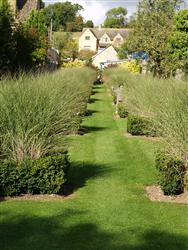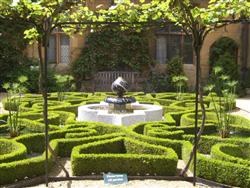
Landscaping is both a unique and exciting industry, that can offer a career that is rewarding on many levels:
For many in this industry, it is the ultimate "multidisciplinary" discipline. A good landscaper gets to express their creativity and artistic flair and apply the skills of a builder, while being a something of a scientist and manager as well.
Course Duration: 600 hours, self paced
Assessment:
- successfully complete all assignments (total number depends upon modules you choose)
- pass a single 1.5 hour exam for each of six modules.

Course Content
You need to complete six modules. Four are compulsory and two are electives.
Compulsory Modules:
- Landscaping I
- Landscaping II
- Landscaping III
- Landscape Construction
Elective Modules
Choose any two of the following:
- Water Gardening
- Permaculture Systems
- Advanced Permaculture
- Horticulture II
- Project Management
- Plant selection and Establishment
- Playground Design
- Green Walls and Roofs
This certificate is accredited through the International Accreditation & Recognition Council.
Graduates who choose to continue studies will be given credit toward higher qualifications with ACS in Australia, ACS Distance Education (UK) or affiliated institutions.
Creating A Design
Landscape design involves both art and science. One without the other does not work.
 A garden must always be constructed properly, with the right materials to be safe, durable and functional. Any garden that is "special" though, needs to go beyond just being built well. It also needs to contain some artistic flair; and be designed to fit with certain principles of design, in order to create an appropriate mood for the situation at hand.
A garden must always be constructed properly, with the right materials to be safe, durable and functional. Any garden that is "special" though, needs to go beyond just being built well. It also needs to contain some artistic flair; and be designed to fit with certain principles of design, in order to create an appropriate mood for the situation at hand.
There are many elements that contribute to the ambience or mood of a garden. Colour is perhaps most significant, however the choice of plants, the quantity of plants (or no plants), the permanent structures and ornamentation are also important.
Active vs. Passive
A garden with a barbecue area, a sandpit, a swing, a pool and a child’s play house would be seen as being ‘active’. It is clear that the garden is more utilitarian. Conversely, a garden with a bench beneath some shade trees, a pond, a sculpture, a herbaceous border and some specimen trees would create an ambiance of tranquility. It is more likely that the owners would spend time resting in the garden and admiring it. It would be considered ‘passive’.
Simple vs. Complex
A complex garden will clearly have lots of intricate areas created through using many different plant species. It may have a number of paths that lead to different areas of the garden. These areas may pertain to a number of different themes. There could be a number of different focal points. It could be planted so that different plants look their best at different times of the year, so as to  maintain year round interest. Such a garden may have a number of effects on ambiance. It may be quite stimulating for the onlooker encouraging them to look further and more deeply into the garden. It may activate their imagination and inspire them toward their own gardening aspirations. If the garden is extremely complex, however, it may also serve to overwhelm some individuals who would prefer something a little less complex so as to be able to relax.
maintain year round interest. Such a garden may have a number of effects on ambiance. It may be quite stimulating for the onlooker encouraging them to look further and more deeply into the garden. It may activate their imagination and inspire them toward their own gardening aspirations. If the garden is extremely complex, however, it may also serve to overwhelm some individuals who would prefer something a little less complex so as to be able to relax.
On the other hand, a simple garden may have few plants, perhaps a large lawn area or paved area and little in the way of features. Such a garden would be more likely to evoke a feeling of relaxation and perhaps permit the onlooker to focus on their own thoughts. If the garden is too simple, however, it may make the onlooker feel disinterested or bored in the garden and it will therefore fail to attract people into it.
Light vs. Shade
The amount of light in the garden has quite a profound effect on mood. A garden that has much light could be associated with feelings of openness, joy, elation and optimism. A garden that has much shade would create feelings of enclosure, frustration, and gloom.
Movement vs. Static
Movement in the garden can be created in a number of ways. It can come about through the natural movement of trees and shrubs in the wind, through mobiles or through water fountains. It gives an air of vitality and of life. The associated sounds reiterate this sense of living; the rustle of the leaves in the trees, the splash of the water. On the contrary, a garden that has little movement may seem rather dull and lifeless.
CAN THIS COURSE HELP ME GET WORK?
No course not matter what area of study or at what level will guarantee you work. There are many other facets to finding a job and advancing your career:
Choosing the right course: in a landscaping course you should learn about landscape construction along with garden design - garden designers need to be able to do more than just draw up a garden plan and choose the right plants, they need to understand the fundamentals of garden construction too. If you don’t understand the fundamentals of landscape construction you really can’t properly manage a landscaping project or produce workable designs that include these types of landscaping elements. If you choose the right combination in a course then you will be ready to tackle a range of landscaping problems, at design stage, when needed.
Choosing the right school: not all schools are equal! Some concentrate on rushing you through the course within set time frames and semesters but at ACS you work at your own pace, starting within days of enrolment. We also support you through your course – just contact us whenever you need to so we can help you to move through your studies as efficiently as possible. Choosing the right school also means that your studies are tailored to suit your needs, industry needs and future job prospects.
Getting the most out of your course: studying is not just about getting that qualification and getting a job isn’t just about your qualifications either. Getting the most out of your course means not rushing through your studies just to get the piece of paper. It means absorbing what you are learning, being able to store that knowledge and recall it later – many years later. Not all courses give you that. Some courses concentrate on competencies rather than encouraging you to develop problem solving skills. With Problem Based or Experiential Learning you are set problems that need to be solved in your set tasks and assignments. Students that study with a school using these methods (such as ACS), tend to absorb knowledge better they are also better at long term memory and recall.
Being passionate about your work: people who are passionate about their work tend to do a lot better they also do far better at their studies. You will also be far more likely to advance further in your career if you are truly interested in the work you are doing or want to do.
Learn to communicate effectively: good communicators are able to converse well with people at any level. They are good listeners. They annunciate clearly. They will have great customer skills, a great attitude to their work, are very good on the phone and know their way around a computer and use them as tools for effective communication. They also know what is and isn’t appropriate language in the workplace. They will understand boundaries. They are usually confident.
Start networking: networking is one of the most effective tools for gaining employment. There are many ways that you can network: join social media groups such as linked-in and make sure that you update your profile as your educational or employment standing changes. Make yourself known within your industry - join industry groups and affiliations, attend seminars, trade shows and exhibitions and any other opportunity for you to mix with your peers or prospective employers.
Always be well-presented: first appearances always count - a well-groomed and appropriately dressed person will always get a better reception than a scruffy one!
This course is designed as entry level training for a career in Landscape Design.
- Work for a landscape construction company as their in-house designer
- Set up your own business in garden and landscape design
- Work as a gardener that offers design and landscape construction services
- Work in a garden centre as their garden design guru